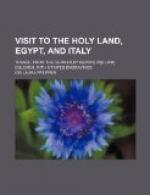The character of these children of nature is, on the whole, a very amiable one. They behaved towards us in an exceedingly friendly and courteous manner, bringing us fruit and water whenever they could procure them, leading us carefully by the safest roads, and shewing us as much attention as any European could have done. But their idea of mine and thine does not always appear to be very clearly defined. Once, for instance, we passed through fields in which grew a plant resembling our pea, on a reduced scale. Each plant contained several pods, and each pod two peas. Our escort picked a large quantity, ate the fruit with an appearance of great relish, and very politely gave us a share of their prize. I found these peas less tender and eatable than those of my own country, and returned them to the soldier who had offered them to me, observing at the same time that I would rather have had mish-mish. On hearing this he immediately galloped off, and shortly afterwards returned with a whole cargo of mish-mish and little apples, which had probably been borrowed for an indefinite period from one of the neighbouring gardens. I mention these little circumstances, as they appeared to me to be characteristic. On the one hand, Mr. S. had been threatened with the fate of St. Stephen for wishing to make a few sketches; and yet, on the other, these people were so kind and so ready to oblige.
This region produces abundance of fruit, and is particularly rich in mish-mish, or apricots. The finest of these are dried; while those which are over-ripe, or half decayed, are boiled to a pulp in large pots, and afterwards spread to dry on long smooth boards, in the form of cakes, about half an inch in thickness. These cakes, which look like coarse brown leather, are afterwards folded up, and form, together with the dried mish-mish, a staple article of commerce, which is exported far and wide. In Constantinople, and even in Servia, I saw cakes of this description which came from these parts.
The Turks are particularly fond of taking this dried pulp with them on their journeys. They cut it into little pieces, which they afterwards leave for several hours in a cup of water to dissolve; it then forms a really aromatic and refreshing drink, which they partake of with bread.
From Damascus to Balbeck is a ride of eighteen hours. Count Zichy wished to be in Balbeck by the next day at noon; we therefore had but a short night’s rest.
The night was so mild and beautiful, that we did not want the tents at all, but lay down on the bank of a streamlet, beneath the shade of a large tree. For a long time sleep refused to visit us, for our encampment was opposite to a coffee-house, where a great hubbub was kept up until a very late hour. Small caravans were continually arriving or departing, and so there was no chance of rest. At length we dropped quietly asleep from very weariness, to be awakened a few hours afterwards to start once more on our arduous journey.




